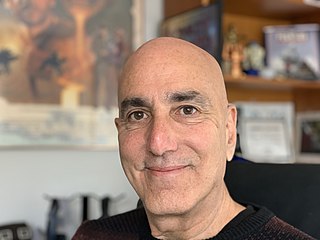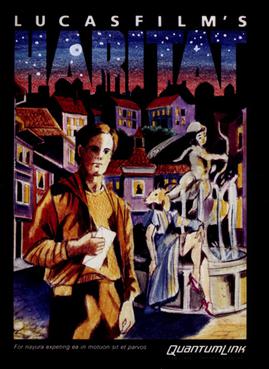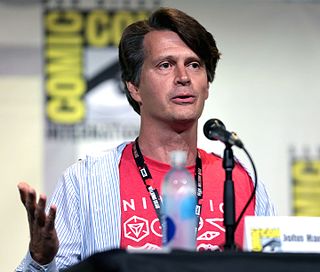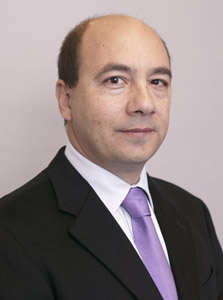
George Walton Lucas Jr. is an American filmmaker and philanthropist. He created the Star Wars and Indiana Jones franchises and founded Lucasfilm, LucasArts, Industrial Light & Magic and THX. He served as chairman of Lucasfilm before selling it to The Walt Disney Company in 2012. Nominated for four Academy Awards, he is considered to be one of the most significant figures of the 20th-century New Hollywood movement, and a pioneer of the modern blockbuster. Despite this, he has remained an independent filmmaker away from Hollywood for most of his career.
Lucasfilm Games is an American video game licensor and a subsidiary of Lucasfilm. It was founded in May 1982 by George Lucas as a video game development group alongside his film company; as part of a larger 1990 reorganization of the Lucasfilm divisions, the video game development division was grouped and rebranded as part of LucasArts. LucasArts became known for its line of adventure games based on its SCUMM engine in the 1990s, including Maniac Mansion, the Monkey Island series, and several Indiana Jones titles. A number of influential game developers were alumni of LucasArts from this period, including Brian Moriarty, Tim Schafer, Ron Gilbert, and Dave Grossman. Later, as Lucasfilm regained control over its licensing over the Star Wars franchise, LucasArts produced numerous action-based Star Wars titles in the late 1990s and early 2000s, while dropping adventure game development due to waning interest in the genre.

Nolan Kay Bushnell is an American businessman and electrical engineer. He established Atari, Inc. and the Chuck E. Cheese's Pizza Time Theatre chain. He has been inducted into the Video Game Hall of Fame and the Consumer Electronics Association Hall of Fame, received the BAFTA Fellowship and the Nations Restaurant News "Innovator of the Year" award, and was named one of Newsweek's "50 Men Who Changed America". He has started more than 20 companies and is one of the founding fathers of the video game industry. He is on the board of Anti-Aging Games. In 2012, he founded an educational software company called Brainrush, that is using video game technology in educational software.

Noah Falstein is a game designer and producer who has been in the video game industry since 1980, winning "Game of the Year" titles for multiple games such as Battlehawks 1942 and Indiana Jones and the Fate of Atlantis. He has designed games for multiple platforms, including arcade video games, Commodore 64, and MS-DOS.

Habitat is a massively multiplayer online role-playing game (MMORPG) developed by LucasArts. It is the first attempt at a large-scale commercial virtual community that was graphic based. Initially created in 1985 by Randy Farmer, Chip Morningstar, Aric Wilmunder and Janet Hunter, the game was made available as a beta test in 1986 by Quantum Link, an online service for the Commodore 64 computer and the corporate progenitor to AOL. Both Farmer and Morningstar were given a First Penguin Award at the 2001 Game Developers Choice Awards for their innovative work on Habitat. As a graphical MUD it is considered a forerunner of modern MMORPGs unlike other online communities of the time. Habitat had a GUI and large user base of consumer-oriented users, and those elements in particular have made Habitat a much-cited project and acknowledged benchmark for the design of today's online communities that incorporate accelerated 3D computer graphics and immersive elements into their environments.
Edutopia is a website published by the George Lucas Educational Foundation (GLEF). Founded in 1991 by filmmaker George Lucas and venture capitalist Steve Arnold, the foundation "celebrates and encourages innovation" in K–12 schools.

Labyrinth: The Computer Game is a graphic adventure game developed by Lucasfilm Games and published in 1986 by Activision. Based on the fantasy film Labyrinth, it tasks the player with navigating a maze while solving puzzles and evading dangers. The player's goal is to find and defeat the main antagonist, Jareth, within 13 real-time hours. Unlike other adventure games of the period, Labyrinth does not feature a command-line interface. Instead, the player uses two scrolling "word wheel" menus on the screen to construct basic sentences.

Rajendra Singh Pawar is an Indian entrepreneur, chairman and co-founder of NIIT Limited, established in 1981. He also founded NIIT University, a not-for-profit university in Neemrana, Rajasthan, in 2009.
Barry Martin Schuler is an American Internet entrepreneur and former chairman and CEO of America Online Inc. He is best known for leading the AOL team that simplified the online service provider's user interface, making it possible for millions of consumers to gain easy access to the Internet.
Dennis O. Harper is an American educator and the founder of Generation YES, a nonprofit technology education organization founded in 1999. He is an active advocate for the transformative power of technology in education and for student leadership as change agents in schools.
Youth and Educators Succeeding, formerly known as Generation YES, was a U.S. based non-profit organization that works with schools around the world to empower underserved students and ensure that technology investments in education are both cost effective and meaningful. Dr. Dennis Harper was the founder and CEO from 1996 to 2020; upon his retirement, Adam F.C. Fletcher succeeded him. YES programs focused on student centered, project-based learning "experiences that impact student's lives and increase student involvement in school and community through the use of technology." In addition, research showed "all YES programs improved the use of technology in the school as a whole."

John Hanke is an American technology executive. Hanke led Google's Geo product division, which includes Google Earth, Google Maps, StreetView, SketchUp, and Panoramio. He is founder and CEO of Niantic, Inc., a software company spun out of Google and the creator of Pokémon Go.

John De Margheriti is an Italian-born Australian electrical engineer, software developer and entrepreneur. De Margheriti is widely seen as a founding 'father' of Australia's video games industry and Australia's most experienced interactive entertainment business executive.
Improbable Worlds Limited is a multinational technology company founded in 2012 and headquartered in London, England. It makes metaverse infrastructure and applications, as well as simulation software for video games and corporate use. It reported revenues of £78m in fiscal 2022, up 260% over 2021.
Burr, Egan, Deleage & Co. (BEDCO) was a venture capital firm which focused on investments in information technology, communications, and healthcare/biotechnology companies.
Polaris Partners is a venture capital firm active in the field of healthcare and biotechnology companies. The company has offices in Boston, Massachusetts, New York, NY and San Francisco, California.
Ralph Guggenheim is an American video graphics designer and film producer. He won a Producers Guild of America Award in 1995 for his contributions to the film Toy Story.
The Institute of Play (IOP) was a 501(c)(3) corporation founded in 2007. Based in New York City, the institute offered school design services, educator programs, game and curriculum design, and corporate trainings / workshops.

Nichole Pinkard is an American computer scientist and the Alice Hamilton Professor of Learning Sciences and faculty director of the Office of Community Education Partnerships (OCEP) in the School of Education and Social Policy at Northwestern. She is helping lead a collaboration with Apple and the Chicago Public School system to teach computer programming to teachers.
Gary Winnick is an American computer game designer, writer, artist, and animator who was the first artist hired by Lucasfilm Games. He co-designed Maniac Mansion, alongside Ron Gilbert, and created the comic book Bad Dreams.








